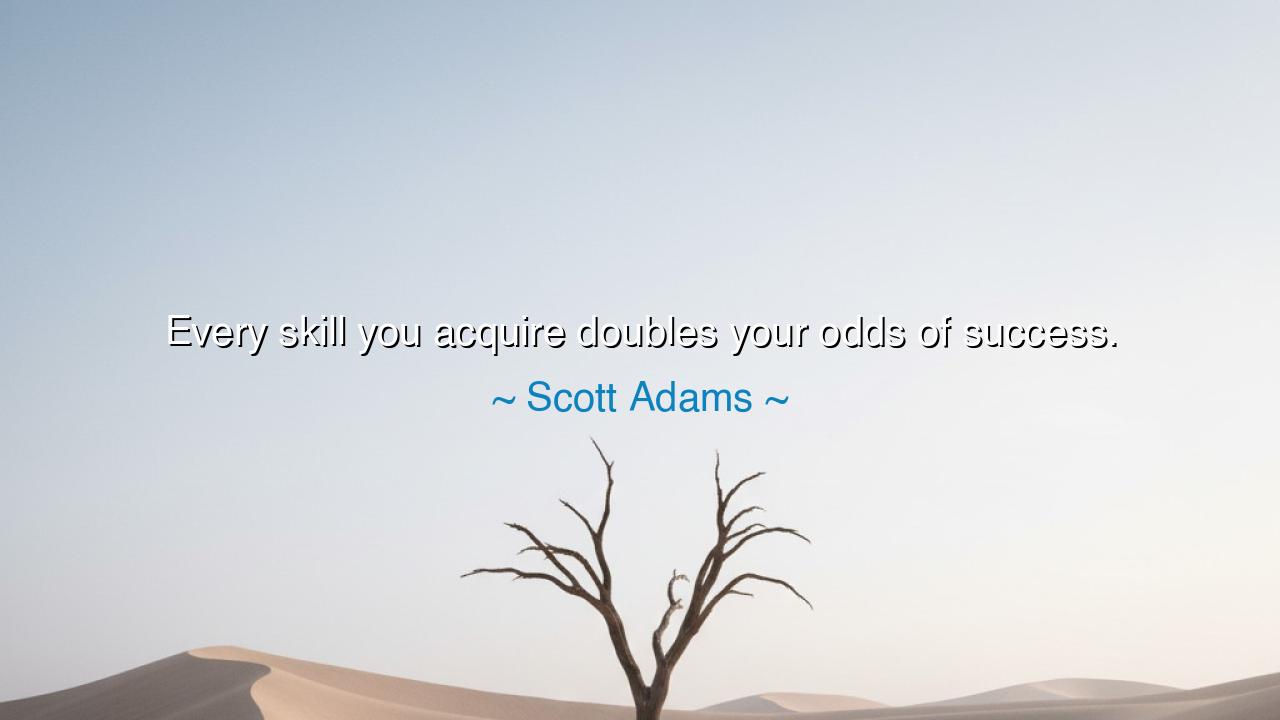
Every skill you acquire doubles your odds of success.






The words of Scott Adams—“Every skill you acquire doubles your odds of success.”—shine like a torch for all who walk the path of self-improvement. In them is revealed a truth as old as civilization: power does not lie in waiting for fortune, nor in hoping for luck, but in arming oneself with knowledge, discipline, and ability. Each skill is like a weapon added to the armory, each talent like a tool added to the workshop, each lesson like a brick laid in the foundation of greatness. One alone may be useful, but many together make a fortress strong enough to withstand the trials of life.
Adams, known widely as the creator of Dilbert, spoke not only as an artist but as a strategist of life. He understood that mastery of a single craft may grant you a chance at achievement, but the combination of many skills multiplies your opportunities. A man who can speak well may persuade, but if he can also write, lead, calculate, and adapt, then the doors of destiny open wider for him. In this way, success becomes not a narrow path but a widening road, paved by the skills one has gathered along the way.
The ancients themselves revered this principle. The Greeks honored Odysseus not only for his courage but for his cunning, his eloquence, and his resourcefulness. He was not the strongest of heroes, nor the swiftest, yet by his multitude of skills he triumphed where others failed. The Romans, too, admired the man of many talents—the homo universalis—who could fight, speak, govern, and build. For in every age, it is the one who gathers many skills who gains mastery over fortune.
History confirms this truth. Consider Benjamin Franklin, who was not only a printer, but a writer, inventor, diplomat, and scientist. His many skills made him indispensable to his nation and immortal in memory. Or think of Leonardo da Vinci, whose hand painted the Mona Lisa but whose mind designed machines, studied anatomy, and sought the secrets of the stars. Their success was not an accident of talent but the fruit of relentless curiosity, each new skill adding another chance at greatness.
The meaning of Adams’s words is both heroic and humbling: you need not be the best in the world at one thing to achieve success. You must instead commit to learning, to gathering, to building a collection of skills that together create strength. The world belongs not only to the prodigy, but to the one who learns steadily, who adds one gift upon another until he becomes a force too versatile to be ignored.
The lesson for us is this: do not despise small learnings. Every new skill, no matter how modest, increases your chances. Learn to write clearly, and you will persuade more. Learn to listen deeply, and you will lead better. Learn to manage money, to speak before others, to adapt to change—each one doubles your odds of triumph. Even when you cannot master a craft completely, a working knowledge will serve you, combining with other talents to magnify your power.
Practically, this means approaching life as a student forever. Do not wait for the world to train you; train yourself. Take on challenges outside your comfort, read widely, practice new arts, and never cease to add to your storehouse of skills. Refuse the prison of narrowness, for the wider your learning, the greater your freedom. For in every new skill, you are not only doubling your odds—you are forging a destiny with your own hands.
Thus, let Adams’s words endure: “Every skill you acquire doubles your odds of success.” Take them as both promise and command. For though fate may grant nothing, and fortune may favor others, the one who learns, who adds, who grows, will find that the odds themselves bend in his favor. And in that bending, the doors of greatness shall open.






AAdministratorAdministrator
Welcome, honored guests. Please leave a comment, we will respond soon